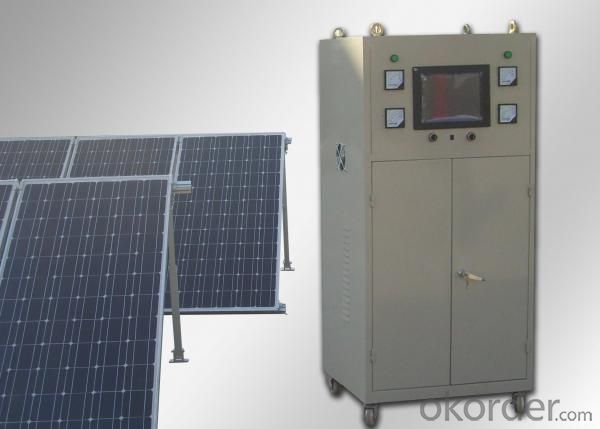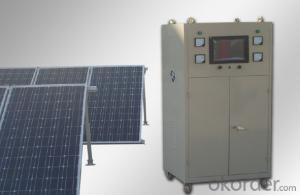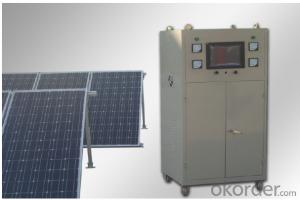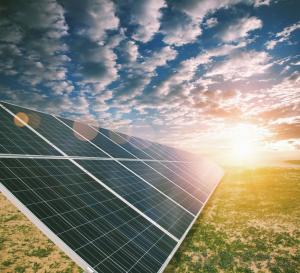Solar Energy Systems Maryland - CNBM Solar Home System CNBM-K8 (5kW)
- Loading Port:
- China Main Port
- Payment Terms:
- TT or L/C
- Min Order Qty:
- 1 set set
- Supply Capability:
- 1000 sets per month set/month
OKorder Service Pledge
OKorder Financial Service
You Might Also Like
Brief Introduction of Solar Energy System CNBM-K8 (5KW)
CNBM Home System-K8 (5KW) has a wonderful capacity.It can be used in factory,home,school and other CNBM Home System-K8 (5KW) consist of the solar modules,charge controller,inverter and battery banks.
CNBM International is highly recognized by its business partners and clients all over the world and has obtained rapid development under the spirit of win-win .
With CNBM Home System-K8 (5KW),
We will carry on the mutual beneficial,innovative and revolutionary trading structure as we did before,create value for our employees,share holders and clients and benefit the whole society in our future development.Please contact us ,if you have interest in CNBM Home System-K8 (5KW),don’t hesitate!
The Sketching of Solar Energy System CNBM-K8 (5KW)
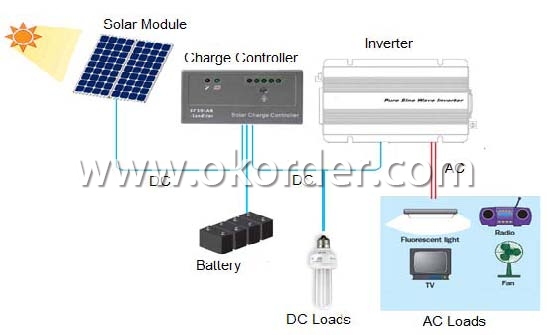
Components of Solar Energy System CNBM-K8 (5KW)
PV Array:
Convert sunlight instantly into DC electric power. Formed by the solar modules (also called photovoltaic modules) in accordance with the system requirements for series and parallel.
Solar Charge Controller:
A charge controller may be used to power DC equipment with solar panels. The charge controller provides a regulated DC output and stores excess energy in a battery as well as monitoring the battery voltage to prevent over charge or over discharge. An inverter can be connected to the output of a charge controller to drive AC loads.
Inverter:
Converts DC output power of photovaltaic soalr panels into standard AC power for use in the local off-grid electrical network. It is a critical component in a photovoltaic system, allowing the use of ordinary commercial appliances.
Battery banks:
Stores energy when there is an excess coming in and distribute it back out when there is a demand. Solar PV panels continue to re-charge batteries each day to maintain battery charge.
Technical data of Solar Home System CNBM-K8 (5KW) | ||
Inverter | Rated load power | 5000W |
Output wave | Pure sine wave | |
Output voltage | DC 110V | |
Output frequency | DC:110V AC:220V | |
Precision of output | 50HZ/60HZ | |
Precision of output frequency | ±6% | |
Solar panel | Pmax | 210W*24PCS |
Vmp | 27.3V*6 | |
Imp | 7.7A*4 | |
Charger | Charger voltage & current | 110V 50A |
Battery | Capacity | 12V 150AH*9*2PCS |
Power box | Spray paint iron box,with input,output,ammeter,voltmeter,master swith and so on. | |
Package of Solar Home System CNBM-K8 (5KW) | ||||
Part | Size(L*W*H mm) | Weight(kg) | 20’(pcs) | 40’(pcs) |
Power box | 840*620*1150 | 140 | 12 Sets | 15 Sets |
Solar panel | 1610*830*100 | 450 | ||
Battery | 1100*520*650*2 | 1100 | ||
Factory Picture of Solar Energy System CNBM-K8 (5KW)
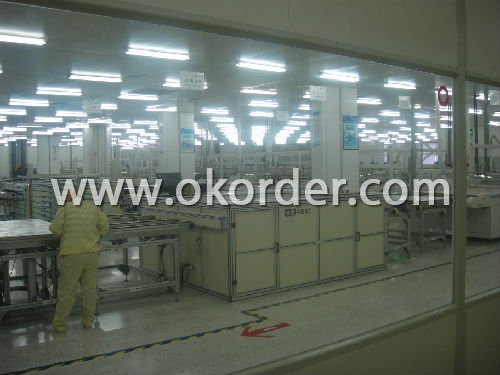
Package Picture of Solar Energy System CNBM-K8 (5KW)
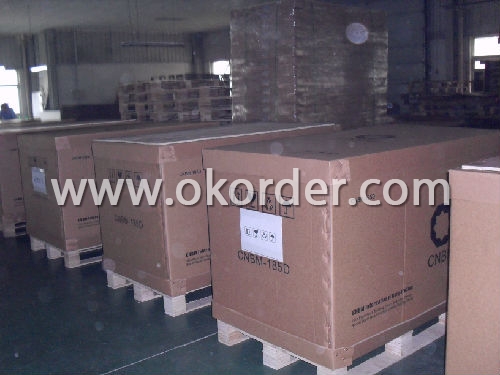
- Q: Can solar energy systems be installed on schools or educational institutions?
- Yes, solar energy systems can be installed on schools or educational institutions. In fact, many schools and educational institutions are increasingly adopting solar energy systems as a sustainable and cost-effective solution to meet their energy needs. These systems not only reduce electricity costs but also provide educational opportunities for students to learn about renewable energy and environmental conservation.
- Q: Can solar energy systems be used in areas with limited access to electricity?
- Yes, solar energy systems can be used in areas with limited access to electricity. In fact, solar energy is a viable solution for such areas as it does not require a connection to the traditional power grid. Solar panels can be installed on rooftops or open spaces to harness sunlight and convert it into electricity. This electricity can then be used to power various appliances and devices, providing a reliable and sustainable source of energy. Additionally, solar energy systems can be paired with energy storage systems, such as batteries, to store excess energy generated during the day for use during the night or on cloudy days. This ensures a continuous supply of electricity even in areas with limited sunlight. Moreover, solar energy systems can be cost-effective in the long run as they reduce dependence on expensive fossil fuels and help lower electricity bills. Overall, solar energy systems are a practical and efficient solution for areas with limited access to electricity, providing a clean and renewable source of power.
- Q: What is the role of maximum power point tracking (MPPT) in solar energy systems?
- The role of maximum power point tracking (MPPT) in solar energy systems is to optimize the efficiency and output of the system by constantly adjusting the operating conditions of the solar panels to ensure they are operating at their maximum power point. MPPT algorithms track variations in sunlight intensity and adjust the voltage and current levels to ensure the panels are extracting the maximum amount of power from the available sunlight. This technology is crucial in maximizing the energy generation and overall performance of solar energy systems.
- Q: What is the impact of electromagnetic interference on solar energy system performance?
- Electromagnetic interference can have a negative impact on the performance of solar energy systems. It can disrupt the communication and control signals within the system, leading to reduced efficiency and functionality. Additionally, electromagnetic interference can introduce noise and disturbances in the power output, affecting the overall reliability and stability of the system. Therefore, proper shielding and mitigation techniques need to be implemented to minimize the impact of electromagnetic interference on solar energy system performance.
- Q: What is the role of solar energy systems in reducing heat island effect?
- Solar energy systems can help reduce the heat island effect by generating electricity from sunlight, which reduces the reliance on fossil fuels and consequently decreases the amount of heat and air pollution emitted into the environment. Additionally, solar panels can provide shade and help to cool urban areas by absorbing and reflecting sunlight, thereby mitigating the intensity of the heat island effect.
- Q: Can solar energy systems be used in powering art galleries or museums?
- Yes, solar energy systems can indeed be used to power art galleries or museums. Solar panels can be installed on the rooftops or surrounding areas of these buildings to capture sunlight and convert it into electricity. This renewable energy source can provide a sustainable and cost-effective solution for powering lighting, climate control systems, and other electrical needs within art galleries and museums. Additionally, using solar energy can contribute to reducing the carbon footprint of these institutions, making them more environmentally friendly.
- Q: Can solar energy systems be used in areas with high levels of humidity?
- Yes, solar energy systems can be used in areas with high levels of humidity. While humidity can affect the performance of solar panels to some extent, it does not render them ineffective. Solar panels are designed to withstand various weather conditions, including high humidity. However, it is important to note that excessive humidity may reduce the efficiency of solar panels slightly, but they will still generate electricity.
- Q: Can solar energy systems be used for powering electric vehicles charging stations?
- Yes, solar energy systems can be used to power electric vehicle charging stations. Solar panels can be installed on the roofs of charging stations or nearby areas to generate electricity from sunlight. This renewable energy can then be used to charge electric vehicles, providing a sustainable and environmentally friendly power source for their operation.
- Q: What is the role of solar energy systems in reducing air pollution?
- Solar energy systems play a crucial role in reducing air pollution by providing clean and renewable energy. Unlike fossil fuels, solar power does not emit harmful pollutants such as carbon dioxide, nitrogen oxides, or sulfur dioxide during its generation. By utilizing solar energy, we can decrease our reliance on fossil fuels and reduce the emissions that contribute to air pollution and climate change.
- Q: What is the role of solar energy systems in reducing stormwater runoff?
- Solar energy systems can play a significant role in reducing stormwater runoff by providing alternative sources of energy that can power water management systems. These systems can be used to pump and treat stormwater, reducing the volume and pollution that would otherwise flow into water bodies. Additionally, solar panels can be installed on rooftops and parking lots, replacing impervious surfaces and allowing rainwater to infiltrate the ground, thus minimizing runoff.
Send your message to us
Solar Energy Systems Maryland - CNBM Solar Home System CNBM-K8 (5kW)
- Loading Port:
- China Main Port
- Payment Terms:
- TT or L/C
- Min Order Qty:
- 1 set set
- Supply Capability:
- 1000 sets per month set/month
OKorder Service Pledge
OKorder Financial Service
Similar products
Hot products
Hot Searches
Related keywords



